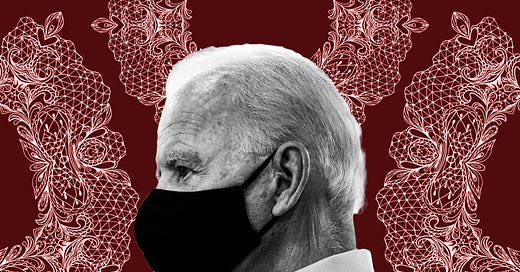In a better world, we would spend this week paying tribute to the remarkable life of Ruth Bader Ginsburg, reflecting on her importance as a historical figure in the American story, and having high-minded discussions of her judicial philosophy and its implications—and limitations—for the future.
We do not live in that world.
So let me express my admiration for her life, my respect for her achievements, and my doubts about her jurisprudence.
Now let's talk politics.
And let me stipulate with respect to politics that a lot is in the air, that the political implications of what might happen over the next six weeks are uncertain, that all kinds of statements and developments could change the political dynamic, and the like.
But sometimes it does pay in analyzing politics to be simple-minded and straightforward.
Here are three facts that I think are more substantial than all the complicated and problematic analogies to 2016 or 2018, that will most likely make more difference than whatever zigs and zags there are in the Senate process, and that will probably outweigh whatever wise or foolish statements and misstatements are made by either candidate or his surrogates.
(1) Ruth Bader Ginsburg was an uncommonly famous and personally admired Supreme Court justice. She seems to have been popular with not just Democrats and liberals, but with many less partisan and ideological voters.
Joe Biden will embrace the memory of RBG. He'll pay effusive (and genuine, for that matter) tribute to her. He'll remind Americans that he presided at her 1993 confirmation hearings, and say how proud he was to help secure a 96-3 vote to confirm her. He'll pledge to nominate a candidate who will carry on and honor her legacy.
Donald Trump will try to be polite about her, but his crowds will make this difficult. And of course whomever he nominates will in fact stand in opposition to much of her jurisprudence.
So Biden will be the pro-RBG candidate.
(2) Polls show that the Supreme Court, deservedly or not, is relatively popular. Most Americans don't want its standing sullied. It will be easy to portray Mitch McConnell and the Republicans as endangering the Court's status. Democrats who simply urge waiting until after the election and letting the next president make a nomination, as in 2016, run very little risk, particularly if they frame this argument in a reasonably high-minded way.
So Biden will be the pro-integrity-of-the-Supreme-Court candidate.
(3) Roe v. Wade is quite popular. In my opinion, undeservedly so. But the American people don't agree with me: 70 percent of them favor keeping Roe in place. We on the pro-life side have spent many years trying to explain why that popularity is undeserved. But every poll shows it's a fact. Just try finding other issues where 70 percent of the public is on the same side. It’s not easy.
So Democrats simply have to say—especially in targeted messaging to key groups—that they will uphold Roe.
It will not be hard for Joe Biden to present himself as the pro-RBG, pro-Supreme Court, and pro-Roe v. Wade candidate. And in each of those cases, he will be sitting smack-dab in the center of the majority opinion. Which is most likely a winning place to be.
There are obvious risks: Biden could be portrayed as likely to appoint radical leftists to the Court. He could be goaded into embracing radical changes in the constitutional structure. He could display disdain for pro-life Americans. He could make unfair attacks against Trump’s eventual nominee, rather than standing on the principle that the pick should be made by the winner of the election.
But these are relatively easy traps for Biden to avoid. Some Democrats and left-wing groups will fall into them, but Biden just has to stay somewhat above that fray. Which is a feat he has achieved, consistently, for the entirety of the campaign.
Then, after paying tribute to RBG, presenting himself as someone who respects the Court, and pledging to defend Roe, Biden will be able to pivot to the issues that have put Trump behind in the race: his mismanagement of the coronavirus, his divisiveness, his failure to rise to the demands of the office, and the like.
Could it all go this straightforwardly from here? Maybe not. But maybe yes.





